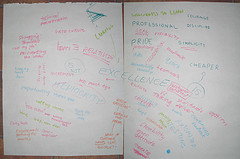Morning
Yvonne Rogers talked about technology to support (remote) collaboration in the second keynote. Most of the solutions looked quite technology-driven. I don’t have much experience with remote collaboration, but it is happening more and more. For example, the XP Days Benelux organizers do most of the work remotely, with a few face-to-face meetings and simple tools (Skype, wiki, mail). But then, we’ve known each other and have worked together for years.
Joseph Pelrine and Jiri Lundak looked into the reasons “Why Agile Projects Fail“. This session had a mix of talks by Joseph and Jiri with exercises for the participants. The failure modes I’ve experienced most often are
- a lack (or lessening) of discipline, which leads to ever lower quality, which slows things down, which leads to corner-cutting and even less quality and so on… At first you don’t notice, so you don’t act. Imperceptibly the team goes from agile to hacking.
- the development team is agile, but the rest of the organisation is not. For example, the team delivers regularly, but the software is not put into production or not used until very much later. Or the development team gets fed bogus features for non-existing customers, because there is no effective feedback loop for sales.
Read more on Simon Baker’s blog.
Afternoon
I tried to go to Duncan and Rachel’s “But that’s crazy! Cognitive bias in decision making“, but the room in Southwark Cathedral was packed full when I arrived. So I dashed back to the Glazier’s Hall to go to “Business is having to change faster to respond to its customers – how can the Agile community help?” by David Stoughton. I’m glad I returned, because this was the session of the conference.
The presentation was excellent in style (très Zen) and content. The session talked about marketing, virality, the quickening pace of business, the challenges of business today, the changing role of the customer. The presenters left plenty of room for discussion. One point was raised about ‘agile’ consultancies: if business has to react fast, why can’t we supply teams quickly to our customers? We talk a lot about agile, but are we agile ourselves? David, will you provide us with pointers to further information?
This was an excellent followup to George Ataya’s session at XP Days Benelux, but faster, more fun and with more discussion. I want to see more of these sessions. I have no problem convincing business people of the value of agile. On the contrary, this is what they’re asking for. The only problem is that many of them are resigned to the fact that this isn’t possible, lulled to sleep by incompetent IT departments, consultants and vendors.
Cut out those incompetent middlemen! Talk to business people directly. Give them back hope. Tell them they already have all the heart, brains and courage they need. Talk about risk, cash flow, visibility, return on investment, alignment, agility. As I said before, stop reading IT books, read some busines, marketing, sales, economy or accounting books. Or go to a keynote by David Stoughton. It will open your mind. XP Day London organizers, will you grant my wish?
Finding back our lost Mojo and Agility in the Conversation Cafe
 Simon Baker and Gus Power hosted the a Conversation Cafe to discuss if we have “Compromised our agility“? The tables in the café had little candle-like lights, writing materials, an initial sketch of one of six reasons agility can be compromised and lollipops. The lollipops could be given to people who talked too much 🙂
Simon Baker and Gus Power hosted the a Conversation Cafe to discuss if we have “Compromised our agility“? The tables in the café had little candle-like lights, writing materials, an initial sketch of one of six reasons agility can be compromised and lollipops. The lollipops could be given to people who talked too much 🙂
Each group wrote down their thoughts about the subject at their table. Then, all but one person moved onto another table to work on another subject. This simple exercise generated a lot of discussion with a lot of different people, so you got a lot of ideas in a very short time. The image on the left shows the thoughts generated about ‘Excellence’.
You can see Simon and Gus’ writeup and the results on their blog.
The discussion continued into the panel discussion on ‘Have we lost our mojo?‘ Has agile crossed the chasm, become mainstream, become boring, become one of the bullet points of major consultancies? Are we no longer the young, plucky rebels taking on the evil empires?
Well, maybe not. Maybe, as Emmanuel Gaillot said, we have outgrown our rebel leather jackets. Maybe we’ve grown up a bit. But that doesn’t mean we have to compromise our agility.
I remember when Vera and I did our first talks about extreme programming. There was one evening seminar for an audience of testers, where the discussion was so animated that the closing drink was skipped. Late at night we were thrown out of the building by the night guard and the discussion continued in the parking lot. They had never heard such ridiculous ideas. People still talk about the seminar today.
Within two years our most vocal opponents of that night had done talks about agile testing, exploratory testing, the role of testers in agile teams on that same stage. Our presentations were greeted with “oh, but that’s just common sense!” shrugs. We had become mainstream, boring…
Really? Well, lots of people claimed to be agile, but didn’t pass muster when you looked, not at what they said, but what they did. That’s why I like extreme programming and Lean. You’re always striving to go further, always looking for impediments to remove. Whenever someone says “You can’t do that here!”, the only sensible reaction is to ask “Why not?”.
I’m glad that people still regularly think I’m crazy. “You want us to decide on requirements later rather than sooner? You want us to release more often to decrease release cost? You want us to go faster to improve quality? You want us to deliver each month, from the first month on? That won’t give us enough time to design our architecture and implement all the infrastructure we will need! What? Release every week? Are you crazy? Next thing, you’re going to tell us you want to release every day, haha! Oh, you are? This goes against everything that we were taught!“. Yeah well, how’s all that learning working out for you?
Question common practice, Jeff Paton said. For example: why do we need backlogs, that essential element from SCRUM? Why can’t we do away with them? I think we can and Dave seems to think so too. Let’s keep questioning everything we do. And let’s keep up the energy and the fun.
Closing
There is no closing at XP Days London, we just go to the pub. Rob, Gino and I had just enough time for one pint. With all that energy from these great sessions, Portia and I continued our brainstorming for session ideas for Agile 2008 and other conferences. We have lots of ideas for several fun sessions. On the train back to Brussels, Gino and I developed another session proposal.
Having attended Bootcamp, XP Days Benelux and XP Days London in a row, I went back to work, energized to do some more crazy stuff.
 Glen Alleman has read Dave Nicolette’s account of the ‘9 boxes’ session. Glen recognizes the structure of the typical ‘agilest’ argument:
Glen Alleman has read Dave Nicolette’s account of the ‘9 boxes’ session. Glen recognizes the structure of the typical ‘agilest’ argument:


